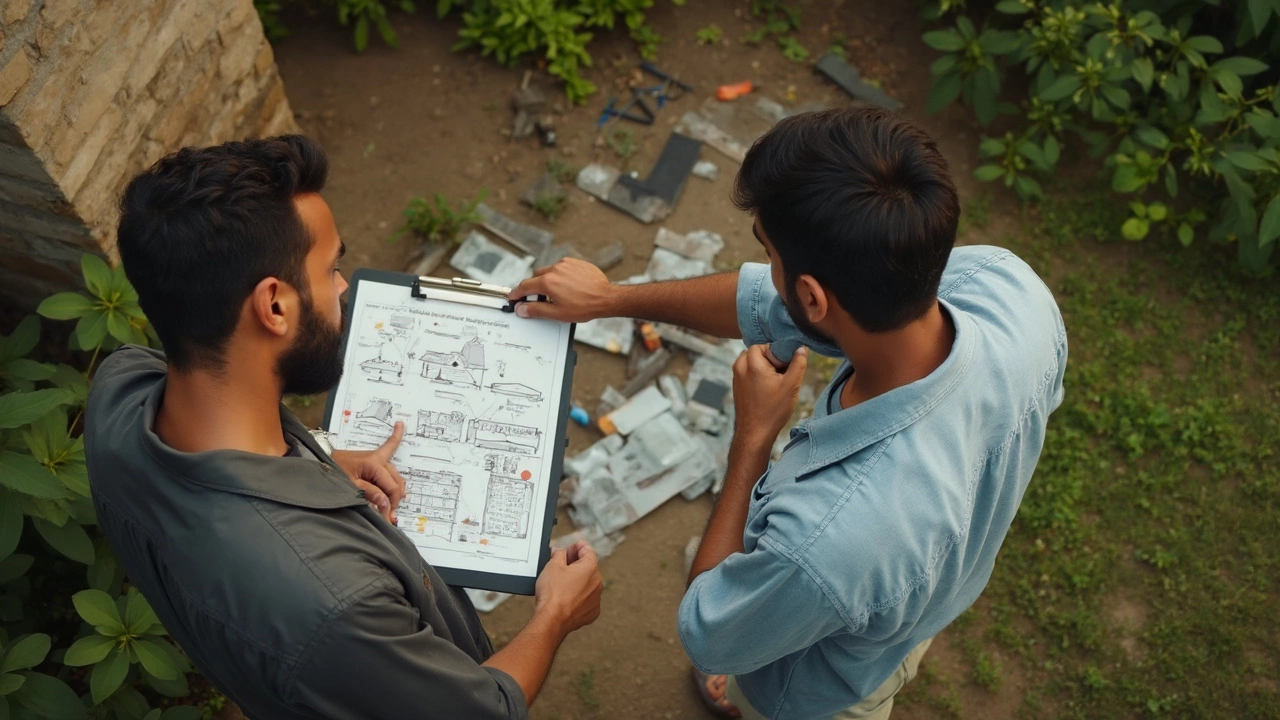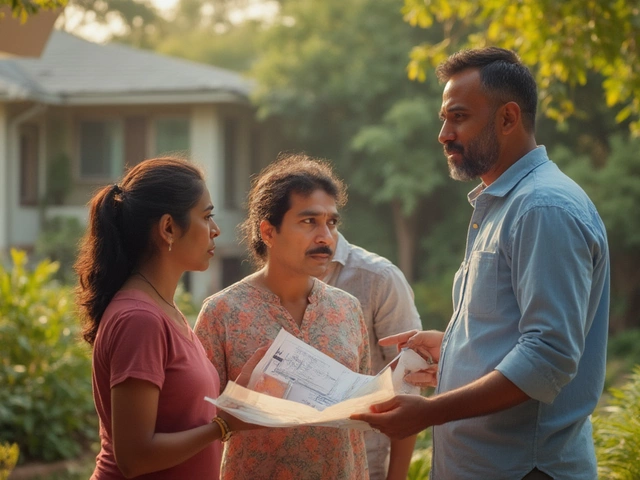How to Negotiate the Price of a New Roof
Ever look at a roofing quote and wonder if you're paying extra just because you didn't ask the right questions? You're not alone. Most folks see a number and think that's it, but in reality, there's usually some wiggle room hidden inside those roofing estimates.
Let's get real—the cost of a new roof often shocks people. It's not like buying a toaster; you can't just price match at the nearest store. Materials, labor, size of your house, and even the season can swing that price up or down. Knowing exactly what's included in a quote is the first step to not getting overcharged. Sometimes, that “free” inspection? It's baked into the final bill.
Don't be afraid to ask for itemized quotes. You'll spot which parts eat up the budget, like underlayment upgrades or weird fees that sound technical but might not matter much to your specific roof. The more you break down the numbers, the easier it gets to challenge or compare the prices when something looks off.
Roofers know a lot more about their pricing than you do. But you hold the power of choice, especially if they're not the only bid you've collected. Most roofers expect a little pushback on pricing—it’s part of the game. But what you push back on, and how you say it, can make the difference between saving real cash and getting brushed aside.
- Understanding Roofing Quotes
- Secrets Contractors Won't Tell You
- Negotiation Tactics That Actually Work
- What You Can (and Can't) Bargain Over
- How to Avoid Getting Burned
Understanding Roofing Quotes
See a roofing quote and your first thought might be, “Wait, why is this number so high?” Roof estimates can look confusing if you’ve never dealt with one before. Most roofers break them down by material costs, labor, disposal, and sometimes a bunch of technical add-ons. The tricky part? Not all quotes are detailed, and some hide their real costs in bland wording.
Here's a fact: Asphalt shingle roofs in the U.S. usually cost between $5,000 to $12,000, while metal roofing jumps higher, often $10,000 to $20,000 or more. The three biggest parts of any quote are materials, labor, and the "extras" (that’s where sneaky fees show up). If the estimate doesn’t clearly list these, ask for an itemized breakdown. Don’t feel bad—roofers expect this question from anyone who’s paying attention.
| Roof Type | Average Cost |
|---|---|
| Asphalt Shingles | $5,000 - $12,000 |
| Metal Roofing | $10,000 - $20,000+ |
| Tile or Slate | $15,000 - $35,000+ |
If you see charges for things like "roof deck protection" or "ridge cap shingles," those aren’t scams—but sometimes they’re marked up. Always ask what every mysterious line item actually means for your home. A detailed quote gives you the power to compare, negotiate, and defend your wallet.
Here’s what a solid quote should include:
- Full breakdown of materials (type, brand, how much)
- Cost of labor—sometimes this is just labeled 'installation'
- Tear-off and disposal fees (for old roofing removal)
- Warranty coverage—both for materials and labor
- Timeline for starting and finishing the job
Why care about the details? Because the roof negotiation game starts with understanding exactly what you’re negotiating over. Comparing apples to apples means calling out anything that looks off, high, or just unfamiliar. The more specific info you have, the better deal you’ll score—and you’ll avoid those classic ‘gotcha’ moments when the final bill hits.
Secrets Contractors Won't Tell You
Roofers talk a good game, but they’re not always going to lay out every card on the table. The truth is, the sticker price in your roof negotiation often includes a nice profit margin and extra padding for “just in case” scenarios—many times, more than they actually need. What’s worse, they know most homeowners don’t question it.
Here are a few things contractors don’t usually mention:
- They expect you to negotiate. Most roofers price their first quote on the high side, knowing someone will ask for a lower rate. If you don’t push back, you’re likely paying more than you have to.
- Material costs can fluctuate, but contractors sometimes lock in prices from wholesalers at a discount. If shingles drop in cost, some won’t pass those savings on to you—they’ll pocket the difference.
- The “hard to schedule” excuse is just that. Even in busy season, most companies want to fill their calendar and will make room if they want your job. Delay tactics? Sometimes they’re just trying to nudge you to commit before you shop around.
- Some warranties sound fancy, but often cover more for the material suppliers than the actual homeowner. Always read the fine print.
- Upsells are common. Things like “roof ventilation upgrades” or “weather barrier add-ons” look important on paper, but ask to see evidence you truly need them for your specific home—or if they’re just padding the bill.
Check this out—here’s a rough breakdown (as of early 2025) of what typically makes up your new roof price, according to a 2024 survey of 110 licensed roofing companies:
| Cost Breakdown | Avg. % of Total Price |
|---|---|
| Materials (shingles, underlayment, etc.) | 38% |
| Labor | 40% |
| Company Overhead | 14% |
| Profit | 8% |
Here’s the catch—not every contractor’s “overhead” or “labor” costs are the same. One might price a job $2,000 higher simply because their crew is less efficient or they’re aiming for bigger margins. If you see big differences between bids, this is probably why.
A key move? Ask straight up which items in the quote are negotiable. You'd be surprised what roofers are willing to trim or match when you question the add-ons or offer to pay cash. Don’t feel bad for pushing—they’re used to it, and if you don’t ask, you’re just handing them extra profit.

Negotiation Tactics That Actually Work
You’ve got quotes in hand and you’re ready to talk numbers. The trick isn’t to become a hardcore haggler, but to use real info to your advantage. Most homeowners can shave off anywhere from 5% to 15% on the final bill if they handle this right. Here’s how to make those savings happen without turning things weird.
- Compare Multiple Quotes: Get at least three bids, even if you already like one company. Contractors know when they’re up against competition and might drop prices or throw in extras to win your job. One 2023 Consumer Reports survey found folks saved over $2,000 on average just by shopping around.
- Ask For Line-By-Line Details: Request a breakdown of labor, materials, extras, and disposal fees. If you see a charge that doesn’t make sense, call it out. Sometimes, these little conversations are where prices magically "adjust."
- Mention Budget Early: Don’t hide your limit. If you’re clear that you have a set budget from the start, contractors are more likely to trim the fat or suggest more affordable options.
- Time Your Project: Prices tend to drop right after storm season or during the late fall when demand falls off. Roofing companies get desperate for projects in the off-season, so use this to your advantage.
- Leverage Payment Terms: If you have cash ready or can pay faster, bring it up. Roofers love quick, hassle-free payments and sometimes knock off a few hundred bucks for clients who don’t drag their feet.
- Ask for Referrals or Upgrades: If a company can’t go lower, see if you can get a free gutter cleaning, warranty extension, or small upgrade instead. These add value without costing them much, and it’s still a win for you.
The best way to negotiate roof negotiation is to stay respectful and act informed, not combative. Roofers aren’t afraid of someone who did their homework. See how some strategies stack up in real life below:
| Negotiation Move | Success Rate (%) | Typical Savings |
|---|---|---|
| Multiple Quotes | 82 | $2,000+ |
| Project Off-Season | 56 | $500-$1,500 |
| Paying Cash/Quick Pay | 39 | $200-$800 |
| Requesting Free Upgrades | 24 | Small extras |
Just remember, your goal isn’t to squeeze every penny. Quality matters. But when companies know you’re not an easy mark, they’re more likely to play fair—and maybe sweeten the deal you actually get.
What You Can (and Can't) Bargain Over
Here's what most people miss: not every part of a roofing quote is up for grabs. Some costs are legit non-negotiable—no roofer can change the price of manufacturer-set shingle costs, for example. But other items? Fair game.
You can usually bargain over:
- Labor costs: Contractors might budge here, especially if you’re flexible on timing or agree to pay cash.
- Disposal fees: Shop these around, or ask for a waiver. Sometimes they toss these in as add-ons.
- Material upgrades: Want a better underlayment or ice shield? Get the price for the basic and the premium—sometimes contractors jack up upgrades more than necessary.
- Warranties: You might be able to get a longer warranty included for free, or at least at a discounted rate.
- Payment schedule: More flexible deals sometimes save you money, like paying a bit more upfront in exchange for a lower total.
What’s mostly off-limits?
- Raw material price per square: Suppliers set these, and even roofers can’t change them much unless they're up for eating the loss themselves.
- Permit fees: The city or county sets these. Zero wiggle room.
- Insurance and license proof: If they’re legit, there’s a real cost involved, and it keeps both sides safe.
Check out this little chart to see what tends to move and what usually stands firm. It’s based on actual pricing data from a 2024 survey of 150 U.S. roofing projects:
| Item | Usually Negotiable | Average Price Swing (%) |
|---|---|---|
| Labor | Yes | 10-20% |
| Materials (base shingles) | No | 2-3% |
| Material upgrades | Yes | 15-30% |
| Disposal fees | Yes | 10-25% |
| Permit fees | No | 0% |
| Warranties | Sometimes | 5-15% |
Roofers have their rules, but it’s also about how you ask. As Mike Holmes, the construction expert on TV, once said:
"Never assume the price is fixed. Good contractors are always willing to explain and sometimes to deal—if you know what you're talking about."
Bottom line: Stick to bargaining over labor, upgrades, extras, and fees, but don't waste time haggling over things they can’t control. That’s how to get the roof negotiation to go your way without burning bridges.

How to Avoid Getting Burned
No one wants to end up with a leaky roof and a maxed-out credit card. The roofing world has its fair share of stories where homeowners got taken for a ride—sometimes by smooth-talking contractors, sometimes by just missing a small detail in the quote. If you want to stay protected, you’ve got to watch your back and do some homework before signing off on anything.
First off, always check that your contractor is licensed and insured. Legit roofers carry proof and hand it over without acting sketchy. In most U.S. states, roofing contractors must have a state license—don’t be shy about asking for a copy and double-checking online with your state authorities. If a roofer dodges these questions, that’s a big red flag.
Next, get everything in writing. A handshake isn’t enough when you’re about to drop thousands of dollars. Your contract should spell out materials, labor, start and finish dates, the exact cost, and the warranty details. Look out for vague language. If it says things like “replace wood as needed” but doesn’t explain how much extra that’ll cost, ask for hard numbers or caps. Surprises are fun for birthdays, not roofing invoices.
Pay attention to payment terms. Never pay the whole bill up front. It’s common to pay a deposit (usually around 10-30%, depending on your state), but full payment should only come after the job is done and you’ve walked the roof (or at least checked good photos of it). If someone pushes for cash only, or wants a huge deposit, step back and keep shopping around.
Always double-check what your warranty really covers. Some “lifetime warranties” sound great but only protect specific materials—not the labor or leaks. Ask for those details in black and white, so you’re not left in the rain if things go sideways.
Here’s a simple checklist to keep handy during your roof negotiation:
- Get three or more quotes from different companies, and compare every line item.
- Only hire insured and licensed contractors—verify both yourself.
- Make sure the contract covers all project details, extra charges, and warranty info.
- Never pay full price upfront—stick to standard deposit rules.
- Ask for references and look up recent online reviews (not just the company’s website).
If you follow these steps, you won’t just save money—you’ll sleep better knowing your roof and your wallet are safe.







Comments